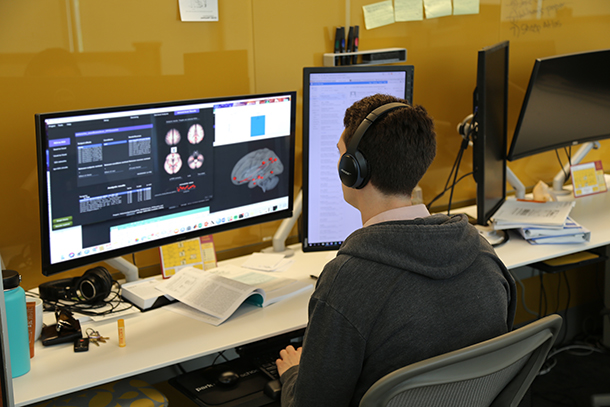An estimated 5.4 million Americans currently live with Alzheimer’s disease, a number that is expected to triple by 2050. One of the most promising methods for defining the disease’s causes and progression is to identify biomarkers, or biological indicators of the disease, in the human brain. But more cross-disciplinary efforts are needed if researchers hope to discover biomarkers that will translate quickly into clinical trials.
Now, six diverse schools, institutes, centers and departments at USC are teaming up to take on the challenge. The program, spearheaded by the USC Mark and Mary Stevens Neuroimaging and Informatics Institute (INI) and the Zilkha Neurogenetic Institute (ZNI) at the Keck School of Medicine of USC, will award more than $875,000 to postdoctoral fellows studying Alzheimer’s disease over the course of five years.
“Institutional training grants provide an invaluable opportunity to mentor the future leaders in our field,” said Arthur W. Toga, PhD, Provost Professor of Ophthalmology, Neurology, Psychiatry and the Behavioral Sciences, Radiology and Engineering; Ghada Irani Chair in Neuroscience; INI director and principal investigator of the project. “This project in particular unites researchers from across the university to establish a uniquely collaborative effort with a vast amount of potential.”
USC offers numerous institutional training opportunities for postdocs, including parallel lines of research on aging and Alzheimer’s disease. But the new project, “Training for the Multiscale and Multimodal Analysis of Biomarkers in Alzheimer’s Disease,” differs from a traditional postdoctoral fellowship in its highly collaborative nature and its emphasis on both the informatics behind Alzheimer’s research and the use of multiple methodologies to study the disease.
Those accepted to the program will examine Alzheimer’s disease biomarkers using four different modes: molecular and cellular methods, imaging tools and informatics, quantitative methods for clinical trials research and large-scale population analyses. The two-year training program also involves lab rotations, seminars and instruction for teaching and grant writing, with the ultimate goal of preparing fellows for a successful career in independent research.
Toga will oversee recruitment and placement of scholars, coordination between centers and the creation of an interdisciplinary network for collaboration. Berislav Zlokovic, MD, PhD, chair and professor of physiology and neuroscience; Mary Hayley and Selim Zilkha Chair in Alzheimer’s Disease Research; director of ZNI and assistant director of the training program, will assist in monitoring trainees, evaluating course materials and providing career development support.
The multidisciplinary effort involves researchers from INI; ZNI; the Department of Biomedical Engineering in the USC Viterbi School of Engineering; the Department of Psychology in the USC Dana and David Dornsife College of Letters, Arts and Sciences; the Leonard D. Schaeffer Center for Health Policy and Economics, a collaboration between the USC Sol Price School of Public Policy and USC School of Pharmacy; and the USC Leonard Davis School of Gerontology. Steven Moldin, PhD, executive director of research advancement, played a key role in developing this project.
Eight scholars will each receive full salary, annual travel costs to attend scientific meetings and tuition remission for continuing education. Graduates from a wide array of doctoral degree programs, spanning biological sciences, psychology, gerontology, engineering and beyond are encouraged to apply.
For more information or to submit an application, please visit http://www.loni.usc.edu/training. Applications are due by Nov. 1.
— Zara Abrams


